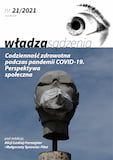The Power of Judgement regarding Covid-19 policies or practices. A reflection from New Zealand
The Power of Judgement regarding Covid-19 policies or practices. A reflection from New Zealand
Author(s): Ben GraySubject(s): Politics / Political Sciences, Politics, Social Sciences, Political Theory, Sociology, Politics and society
Published by: Wydawnictwo Uniwersytetu Łódzkiego
Keywords: Complexity; Trust; Covid-19; Judgement
Summary/Abstract: Judgements are made when problems are complex and there is insufficient information or too many competing factors for a protocol or guideline to be helpful. Judgements inevitably reflect values and beliefs of what is good. They are based on an ethical foundation. A particular ethical issue relevant to Covid-19 is inequality of health outcomes. Making a judgement is of little moment if the person making the judgement is not trusted by anyone else. An understanding of trust is important. Many judgements that impacted on the outcome of Covid-19 were made in the years before the pandemic. Judgements on the science underlying decisions should be made by the specialists in that area o science. It is important to be clear for whose benefit a judgement is made. Is it for the individual, for a particular community, a particular country or for the whole world? In the case of Covid-19 a decision made that did not at least consider the impact on the rest of the world was likely to be flawed, given that the pandemic is a global problem needing a global approach. Judgements during a novel pandemic are by definition made on insufficient information. To mitigate this, they need to be made transparently, clearly enunciating the reasons for the judgement, based on as much consultation as possible and trying to avoid unconscious bias. This has been an existential crisis for us all. We need to make judgements differently in the future or we risk this disaster being repeated.
Journal: Władza Sądzenia
- Issue Year: 2021
- Issue No: 21
- Page Range: 32-45
- Page Count: 14
- Language: English

